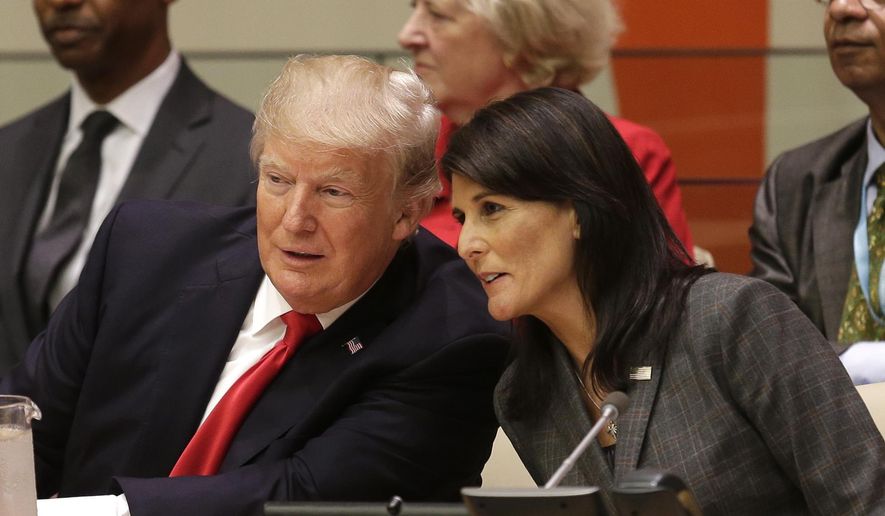President Trump’s recognition of Jerusalem as Israel’s capital came under fresh assault Monday, as the U.S. was forced to veto a U.N. Security Council resolution demanding that Washington reverse course and rescind its policy shift.
In a show of the frustration Mr. Trump’s move has caused internationally, all 14 other members of the council — including U.S. allies Britain and France — had voted in favor of a resolution saying Washington should not prejudge negotiations with the Palestinians on the final status of the contested city.
But U.S. Ambassador to the U.N. Nikki Haley wasted no time halting it and calling the resolution “an insult” that “won’t be forgotten.”
While the resolution, drafted by Egypt, had not actually mentioned the United States or Mr. Trump, it marked a clear rebuke of the administration’s recent policy shift recognizing Jerusalem as Israel’s official capital and beginning the process of relocating the U.S. Embassy from Tel Aviv.
Ms. Haley said the resolution amounted to an “accusation that the United States is setting back the prospects of peace.”
“That is a scandalous charge,” she said in remarks that drew praise from Israeli hardliners and revived memories of past U.N. campaigns in which the U.S. and Israel stood virtually alone over the future of the peace process.
Israeli Prime Minister Benjamin Netanyahu compared Ms. Haley to a “Maccabi” — ancient warriors celebrated for expanding Jewish-controlled territory on the Mediterranean in the pre-Christianity era.
“Thank you, Ambassador Haley,” he tweeted Monday. “On Hanukkah, you spoke like a Maccabi. You lit a candle of truth.”
The U.S. provides Israel with about $3 billion in mainly military aid each year.
Britain and France, meanwhile, joined Russia and China in backing Monday’s resolution, which specifically demanded that all U.N. member nations honor Security Council measures on the Israeli-Palestinian conflict and the future of Jerusalem, home to Jewish, Christian and Islamic holy sites.
“The status of Jerusalem should be determined through a negotiated settlement between the Israelis and the Palestinians, and should ultimately be the shared capital of the Israeli and Palestinian states,” British Ambassador Matthew Rycroft said in Monday’s debate.
Mr. Trump’s move has triggered street protests and widespread condemnation across the Middle East. Last week, representatives from 57 Muslim-majority nations gathered in Turkey to criticize the policy shift and demand that Jerusalem’s eastern sector now be recognized as the capital of a “State of Palestine.”
Turkish President Recep Tayyip Erdogan, who hosted last week’s gathering, made fresh headlines over the weekend by announcing plans to headquarter a new Turkish embassy for the Palestinians inside eastern Jerusalem, saying it will only be a matter of time before the Arab-controlled sector of the city becomes home to the diplomatic outpost.
The U.S. policy shift was expected to take center stage during a visit this week to Egypt and Israel by Vice President Mike Pence, but the administration said Monday that the trip has now been postponed until next month.
Officials in Mr. Pence’s office, according to CNN, said they decided at the last minute to delay the trip to ensure Senate passage of the GOP tax bill, over which Mr. Pence might have to cast a tie-breaking vote.
But Palestinian President Mahmoud Abbas said Monday he can no longer accept the Trump administration as an impartial mediator in Israeli-Palestinian diplomacy. Mr. Abbas said in public comments to senior Palestinian officials Monday that “a crazy person wouldn’t accept” such a role for Washington after Mr. Trump’s announcement two weeks ago.
In some ways, Mr. Trump’s move represents a return to strong U.S. support for Israel at the U.N. after a downturn in bilateral relations under President Obama.
In his final weeks in office, Mr. Obama broke with longstanding U.S. diplomatic tradition when he authorized an “abstain” vote rather than veto a January Security Council resolution condemning new Israeli settlements in the West Bank land claimed by the Palestinians.
The United States is one of five permanent Security Council members with veto power. The Middle East Eye, a U.K.-based analysis website, says Washington has used the power to block Israel-related resolutions on 43 occasions since 1970.
But Ms. Haley argued “the veto is not something the United States does often.” She also asserted that Monday’s veto marked Washington’s first usage of the power “in more than six years.”
“We do it with no joy, but we do it with no reluctance,” she said, adding, “the United States will not be told by any country where we can put our embassy.”
⦁ Carlo Munoz contributed to this article, which was based in part on wire service reports.
• Guy Taylor can be reached at gtaylor@washingtontimes.com.




Please read our comment policy before commenting.